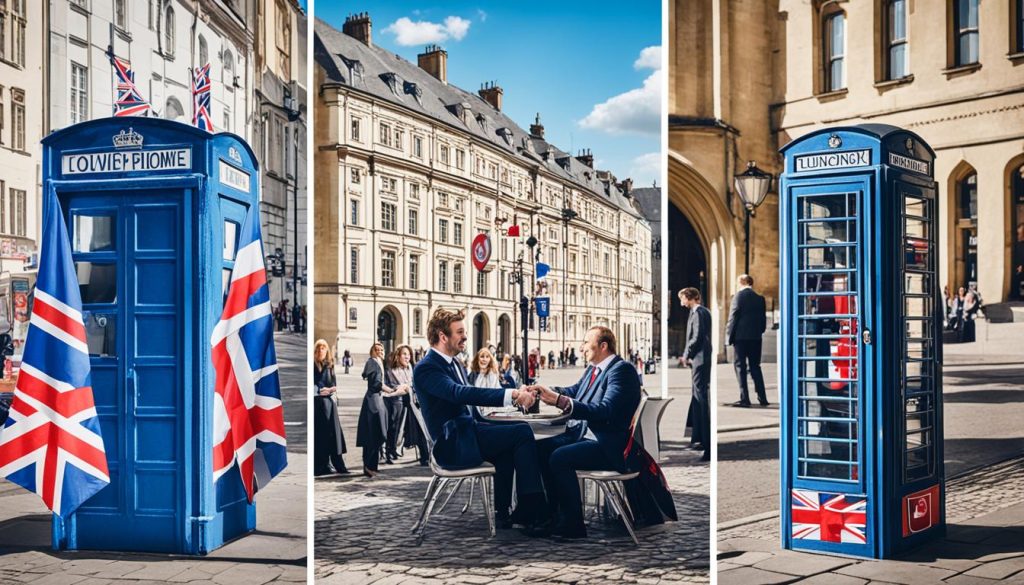Exploring international business means learning about different countries’ traditions and innovations. A study of the United Kingdom and Slovakia shows how their business and culture compare. This gives us a close look at their trade, negotiations, and partnerships.
In a world that’s becoming more connected, it’s vital to understand the various ways countries handle business. The UK and Slovakia have their unique methods of managing economics, making decisions, and balancing work with life. Knowing these aspects helps in better international cooperation and in overcoming the challenges of working across cultures.
Key Takeaways
- Understanding business practices in both the UK and Slovakia is crucial for successful international collaborations.
- Cultural nuances significantly impact the way business is conducted and relationships are formed.
- UK-Slovakia comparisons provide valuable insights into the varied approaches to entrepreneurship and societal interactions.
- Cross-cultural analysis helps in recognising potential challenges and opportunities in diverse business environments.
- Familiarity with each country’s unique business etiquette and negotiation styles can lead to more effective partnerships.
- Acknowledging the importance of work-life balance is part of appreciating the overall business and cultural climate.
Nation Branding and International Perception
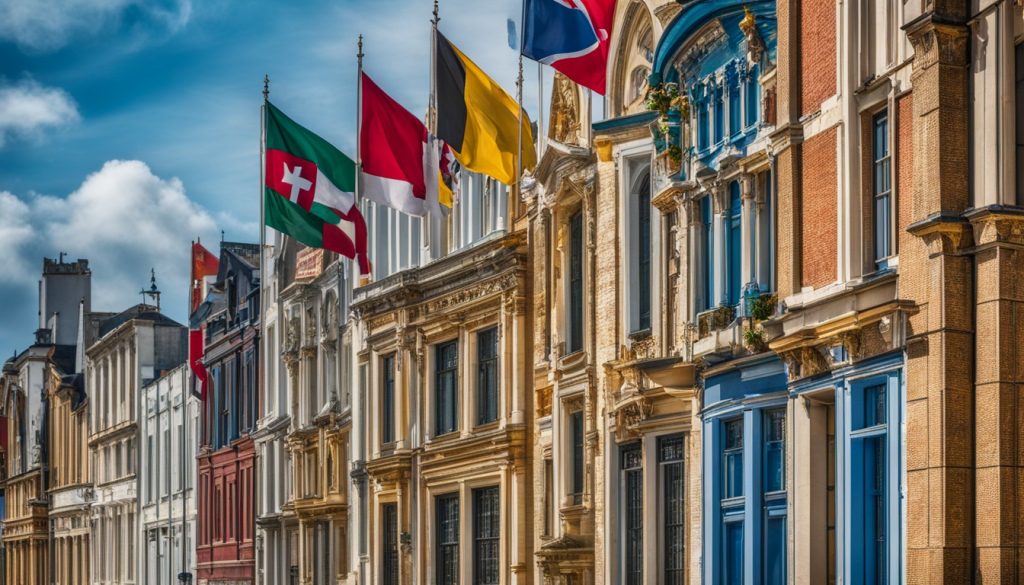
Nation branding shapes how the world sees a country. It’s key for tourism, trade, and national pride. Countries aim to project a positive image to influence how they’re seen both inside and outside their borders.
Future Brand Country Index Insights
The Future Brand Country Index gives us insights into how strong a country’s brand is globally. It looks at value systems, life quality, business potential, and recognition of products. It shows which countries are doing well in branding themselves to the world.
Slovakia’s Brand Evolution
Slovakia has moved up in the world of nation branding. From 44th in 2014 to 35th now, it shows their efforts are working. This rise highlights better global recognition and shifts in how people view Slovakia.
United Kingdom’s Global Image
On the other hand, the UK’s ranking has dropped, going from 12th to 19th. This suggests the UK needs to rethink its branding strategy. Keeping a strong national image requires adapting to how the world changes.
| Country | 2014 Ranking | 2019 Ranking | Notable Changes |
|---|---|---|---|
| Slovakia | 44th | 35th | Improved global perception |
| United Kingdom | 12th | 19th | Shift in international image |
Nation branding shows whether a country is moving up or down in global opinion. It tells government and brand experts they must keep their strategies fresh. By doing so, they can positively shape their country’s story in the world’s eyes.
Value Systems: Shaping Business and Societal Norms
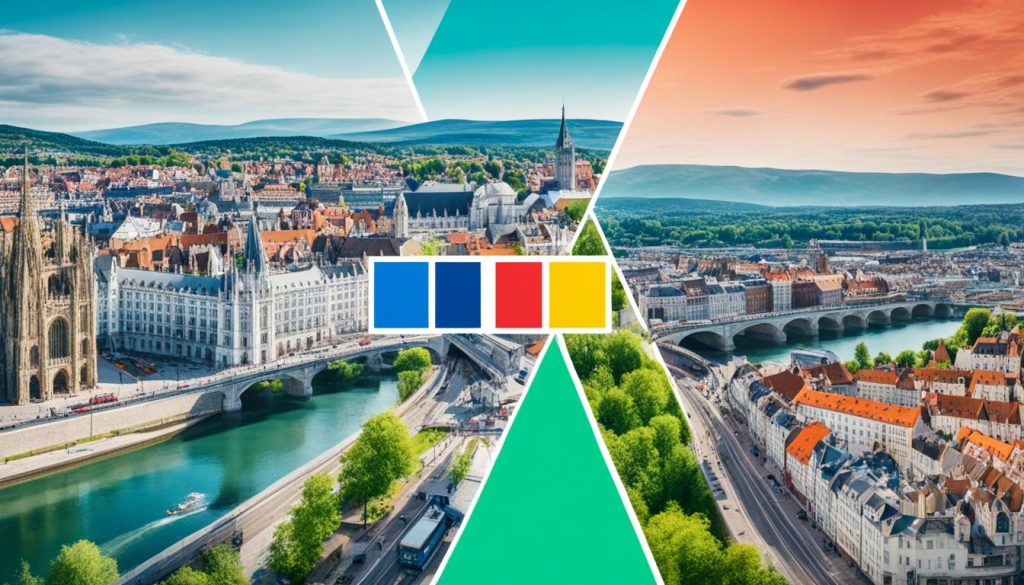
In the UK and Slovakia, respect for freedom and the environment is key. Both countries follow important societal rules. These rules help shape their own policies and how they interact with other countries. They are navigating through changes, keeping their political and environmental values in focus.
Slovakia’s Political Freedom and Environmental Standards
Slovakia values democracy, allowing people to share their views and vote fairly. It sticks to high environmental standards as part of the EU. Slovakia is working towards less pollution and better use of land, improving its environmental impact.
The UK’s Stand on Tolerance and Environmental Policies
The UK is known for valuing freedom, leading to a diverse and tolerant society. It is actively improving its environmental actions despite past challenges. The UK aims to lower its carbon output and meet international environmental pledges, moving towards better global standards.
Quality of Life: A Comparative Analysis
The drive to improve social quality of life is key in evaluating wellbeing around the world. Comparing how Slovakia and the UK meet their people’s needs offers insight into their social well-being. We aim to understand the factors contributing to contentment and the efforts to create a thriving society.
Quality of life must be measured not only by subjective perceptions but also by the ability of a population to fulfil their basic needs, enjoy their rights and feel integrated into society.
Looking at wellbeing standards, we consider both hard facts and how people feel. Objective measures include economic health, safety, and healthcare facilities. Subjective aspects consider happiness and satisfaction. We highlight the Global Peace Index to show Slovakia’s high rank, pointing to a more peaceful society compared to the UK.
We will now review some key stats comparing the satisfaction of needs in both countries:
| Indicator | United Kingdom | Slovakia |
|---|---|---|
| Global Peace Index | Ranked 45 (2022) | Ranked 33 (2022) |
| Healthcare Quality | High standards with NHS | Continuously improving |
| Education System | World-renowned institutions | Free and compulsory education |
| Environmental Quality | Struggling with CO2 emissions | Reduced emissions, bettering bio-capacity |
| Happiness Index | Generally high | Steadily increasing |
The data shows Slovakia and the UK are working towards better living standards. They both excel in education but differ in environmental efforts and peace levels. This affects the social quality of life greatly.
Through this comparison, we see the distinct and common hurdles they face. It sheds light on possible ways to improve social wellbeing and meet community needs.
Exploring Business Potential in Slovakia and the UK
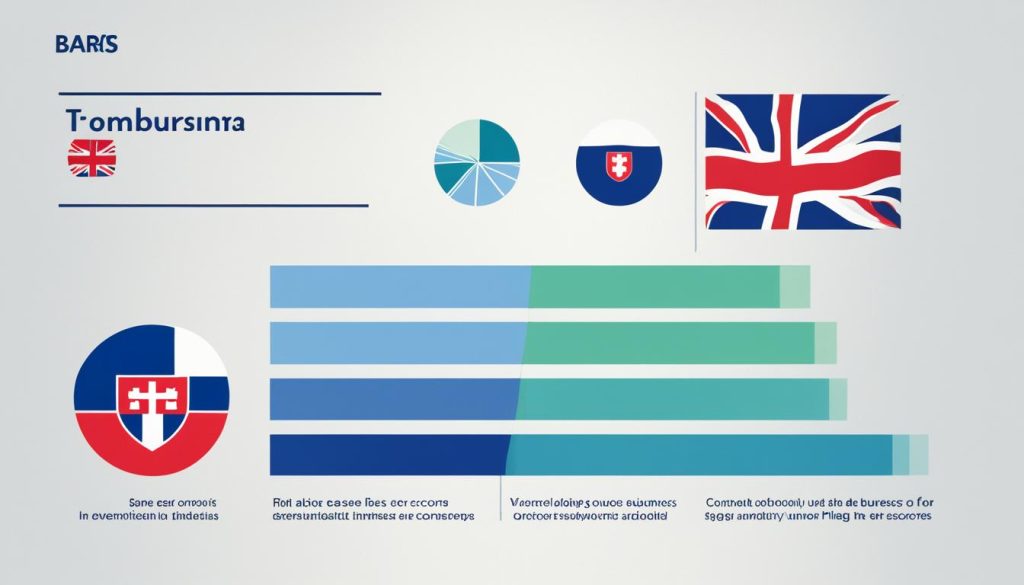
Finding and using business potential is crucial for a country’s success worldwide. Doing business indexes and economic rankings help measure a country’s commerce strength. Slovakia and the UK provide great opportunities for businesses to grow.
Slovakia has been moving up in economic rankings. This is because of policy changes and better business incentives. These efforts have made its business environment much better.
Slovakia’s Good for Business Atmosphere
In recent times, Slovakia has become known for its positive business climate. It focuses on sustainable growth and stability. The country blends fiscal discipline, innovative strategies, and foreign investment appeal, making it stand out.
Technological Advancements and Infrastructure in the UK
The UK is known for its tech innovations and strong infrastructure. This has made it a top place for businesses. Entrepreneurs in the UK benefit from a tradition of industrial quality and digital progress.
Both Slovakia and the UK have unique qualities that help businesses grow. Slovakia is emerging with new opportunities, while the UK offers a developed market. We will explore what makes Slovakia and the UK attractive for business.
Cultural Heritage and Its Impact on Tourism
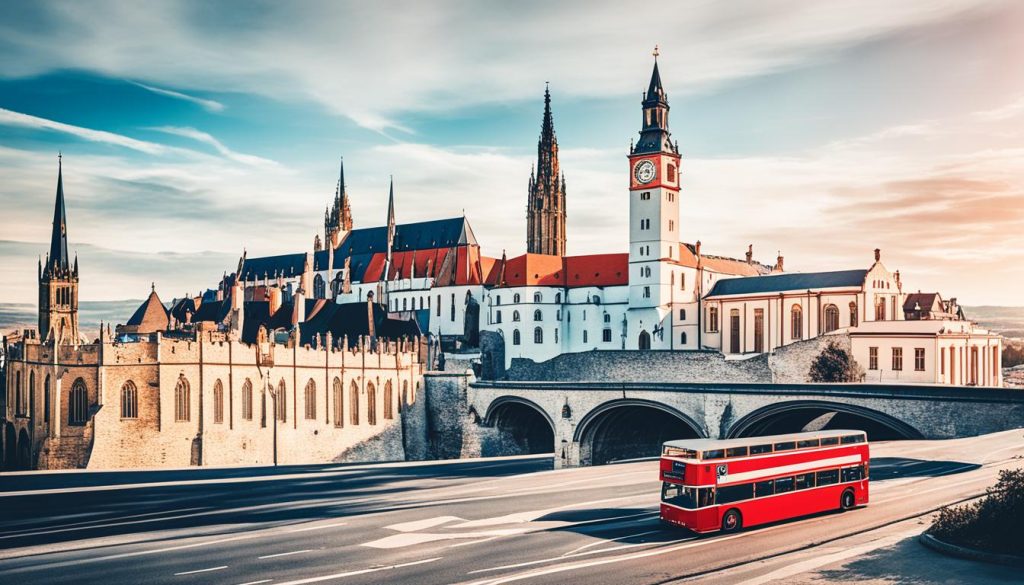
Cultural heritage does more than connect us to our past. It’s key in boosting tourism. History’s rich stories are captured in landmarks, offering travellers a direct link to past achievements, traditions, and milestones.
The Lure of Historical Points and Natural Beauty
In places like Slovakia and the United Kingdom, cultural heritage attracts tourists. Sites like Edinburgh Castle and Spiš Castle have huge appeal. The beautiful settings of these landmarks attract nature lovers and history enthusiasts.
Tourism’s Contribution to National Economies
Tourism greatly helps national economies, thanks to the draw of cultural heritage sites. Visitors come not just to see the landmarks, but they also spend money on hotels, food, and shopping. This spending supports local businesses and communities.
| Country | Landmark | Annual Visitors | Revenue Generated |
|---|---|---|---|
| United Kingdom | Tower of London | 2.98 million (2019) | £58 million (2019) |
| Slovakia | Bratislava Castle | 1.2 million (2019) | Not Publicly Available |
Historic buildings are not just about architecture or culture. They are key to boosting tourism worldwide. This boosts the global economy.
The ‘Made In’ Factor: Perceptions of Product Authenticity

Seeing a ‘Made In’ label shapes how we view a product’s realness and skill. It shows the quality and innovation a country is known for. This label greatly influences how we see a brand worldwide.
Made in Slovakia: Unique Products and Quality
Slovakia is known for its exceptional manufacturing standards. This makes ‘Made In Slovakia’ products stand out for being unique and high-quality. Such craftsmanship boosts the country’s image, helping it to stand tall in global markets.
‘Made in the UK’: The Value of British Craftsmanship
The ‘Made in the UK’ tag is celebrated worldwide for its top-notch craftsmanship. British items carry a legacy of excellence. This has placed the UK in a prime spot globally and makes its exports more appealing. This reputation goes beyond borders, building trust and a sense of true craftsmanship in every British-made item.
Environmental Standards and Ecological Footprints
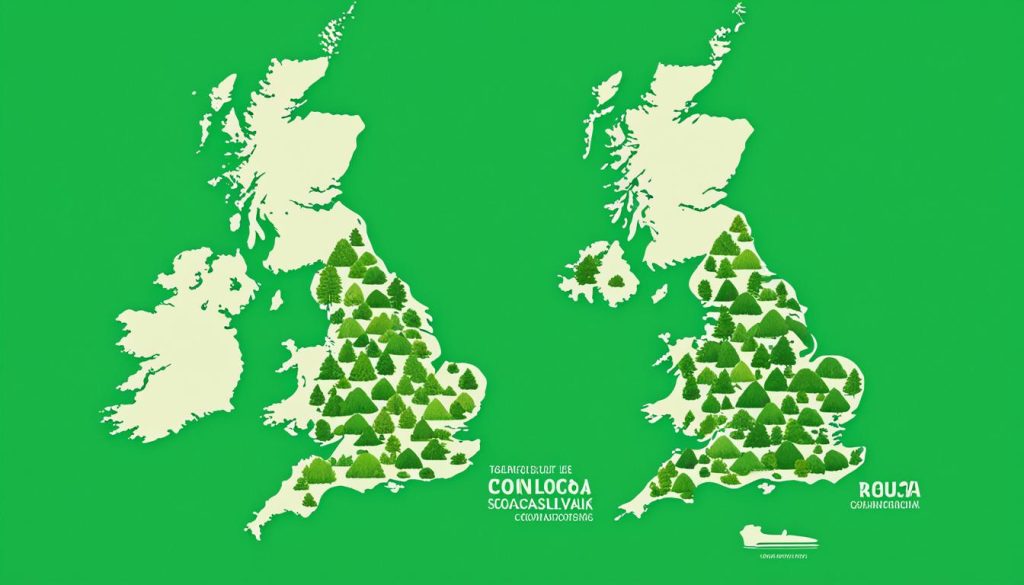
Measuring how much nations impact the planet is key to understanding their sustainability efforts. The UK has worked hard to better its environmental standards, despite its big ecological footprint caused mostly by CO2 emissions. Recently, it has taken steps that show it’s moving towards a more ecologically balanced future.
In contrast, Slovakia shows great improvement in being environmentally responsible. It has successfully reduced its CO2 emissions and uses its cropland more sustainably. This progress is a good sign and serves as an example for countries facing similar issues.
Let’s look at the figures to see how the UK and Slovakia are doing in terms of their environmental impact:
| Indicator | United Kingdom | Slovakia |
|---|---|---|
| CO2 Emissions Reduction (latest % change) | Negative | Positive |
| Ecological Footprint (global hectares per capita) | High | Moderate |
| Biocapacity Deficit Improvement (yes/no) | Yes | Yes |
Both countries understand the importance of strict environmental policies, though they are at different stages. They stress the need for sustainable actions. The challenges they face push for faster reforms.
“Sustainability necessitates a harmony between the environment, economy, and society. Fostering this equilibrium is not just a matter of policy, but of global responsibility and survival.”
There are hurdles, but both nations keep making strides in lessening their ecological footprints. Their efforts offer hope for the world’s sustainable future.
Economic Indicators and Living Standards
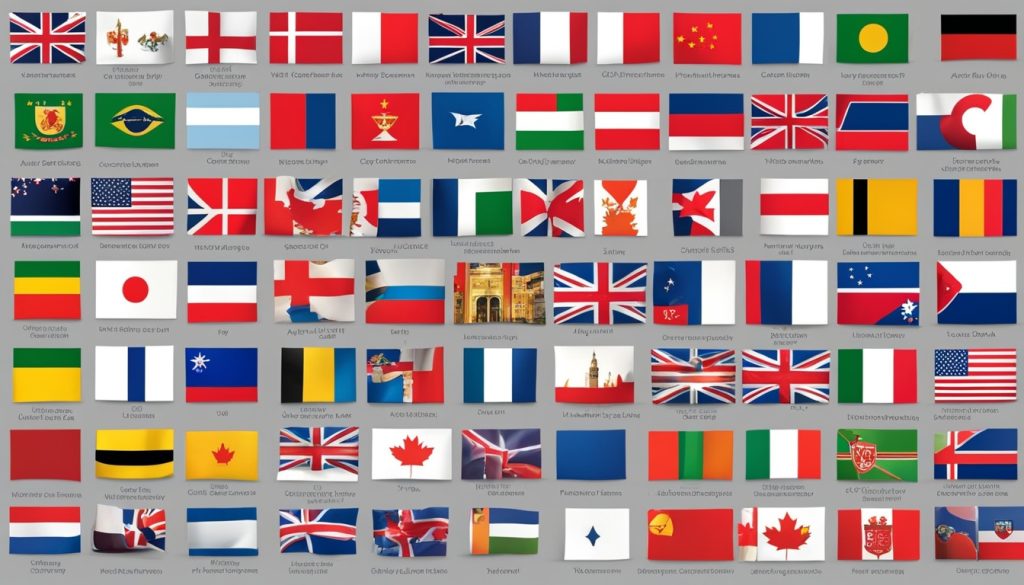
Economic performance is often shown through indicators like GDP and income. They help paint a detailed picture of a country’s economy and citizen living standards. By looking at these measures, we can understand how well a country is doing. Let’s see how Slovakia and the United Kingdom compare on these economic and living standards.
Comparing GDP and Income Levels
A country’s GDP says a lot about its economy’s size and strength. It tells us about potential wealth for its people too. Slovakia’s GDP is climbing, showing its economy is growing strong. On the other hand, the UK’s economy is large, showing it’s well-developed and powerful.
Analysing the Cost and Standard of Living
To figure out living costs and standards, we look at lots of factors. These include how much people spend on basics, if they can afford a home, and if they can get good healthcare and education. When we examine these, we see how GDP relates to how people live in Slovakia and the UK.
| Indicator | Slovakia | United Kingdom |
|---|---|---|
| GDP (Nominal) | Improving steadily | High |
| Income Levels | Increasing with economic growth | Generally higher, with regional variances |
| Average Cost of Living | Lower relative to income | Higher with substantial regional disparities |
| Housing Affordability | More accessible housing market | Expensive, particularly in urban centres |
| Healthcare Access | Universal coverage under public system | Broadly accessible, NHS provides free healthcare |
| Education Quality | Competitive national education system | World-renowned educational institutions |
In summary, comparing these factors shows differences in living standards tied to economic success. Slovakia’s growing economy signals better living conditions for its people. Meanwhile, the UK’s strong economy offers a stable base for its citizens, despite higher costs of living. Both countries show how big economic policies affect everyday life.
Leveraging Heritage and Culture for Economic Gain

In our global world, Slovakia and the United Kingdom use their culture to boost the economy. They turn their history into a story that attracts tourists. This cycle of investment helps both countries grow economically. Preserving cultural sites also builds national pride.
Tourists love exploring old castles and local traditions. When they visit, they spend money on hotels, food, and gifts. This helps local businesses and creates more jobs in services. It’s a great example of how culture and business work together.
“Countries that identify and use their historical and cultural assets unlock new sources of economic and social value.”
The impact of a culture-driven economy is huge and goes beyond making money. It changes how we see places, supports new ideas, and encourages us to save our heritage. We need to find a balance. This ensures we keep our cultural treasures safe for future generations.
| Aspect | Slovakia | United Kingdom |
|---|---|---|
| Cultural Landmarks | Castles, Folklore Museums | World Heritage Sites, Royal Palaces |
| Economic Impact | Tourism accounts for significant GDP contribution | Heritage sector supports thousands of jobs |
| Investment in Heritage | Revitalization projects for historic villages | Conservation grants for historic buildings |
| Cultural Experience | Folk festivals, Crafts workshops | Theatre, literature festivals, historical re-enactments |
This chart shows how Slovakia and the United Kingdom use their culture to strengthen their economies. They not only keep the legacy of the past alive but also build a future full of innovation. Their heritage isn’t just a memory – it’s the backbone of a thriving, modern economy.
Insights on Tourism, Attractions, and Heritage
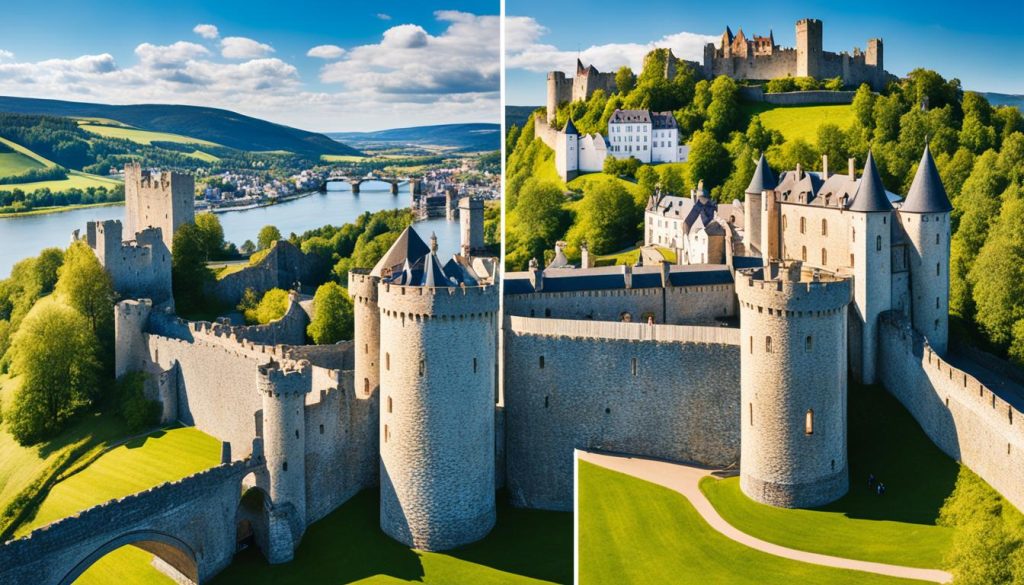
Slovakia and the UK have lots to offer in terms of heritage and culture. Slovakia welcomes you with stunning fortresses and mountains. The UK, on the other hand, has grand homes and a lively history that tourists love. Together, they make their mark on the world’s tourism scene thanks to their unique histories.
It’s not just the landmarks, though. Festivals, museums, and galleries also draw people from all over. They let us peek into the heart of these countries, keeping traditions alive and celebrating new art and identities.
Travellers looking for real experiences will find cultural heritage invaluable. Attractions show us a nation’s journey through time, creating a bond that visitors find deeply moving.
When we look at what these countries have to show, their differences are clear:
| Country | Historical Tourist Attraction | Natural Tourist Attraction | Cultural Event |
|---|---|---|---|
| Slovakia | Spiš Castle | High Tatras Mountains | Východná Folk Festival |
| United Kingdom | Tower of London | Lake District National Park | Edinburgh Festival Fringe |
These attractions play a big role in the economy of both countries. They bring in visitors and make a name for themselves in the world of tourism.
- Slovakia’s mountains and castles tell stories of magic and long-ago adventures.
- In the UK, London’s buildings and the Cotswolds’ natural beauty merge the new with the old. This mix attracts those wanting to dive into culture and history.
The blend of attractions, heritage, and culture is key to both Slovakia’s and the UK’s tourism success. They promise great possibilities for growth and maintaining interest in their stories.
Meeting Business Needs: Infrastructure and Technology
The world of technological developments moves quickly, and solid business infrastructure is essential. Efficiency and connectivity are more important than ever before. Countries must improve their tech and infrastructure to draw in foreign investment and help local businesses grow. Slovakia is making great strides, investing in technology. The UK is also expanding its infrastructure, making it a top choice for many industries.
From fibre-optic broadband networks to high-speed rail links, both Slovakia and the UK are recognising the immense value that investments in technology and infrastructure bring to the table – not just for the bottom line but also for societal advancement.
Slovakia is working on its digital presence while the UK leads in tech innovation. These efforts keep the business world competitive and hospitable for new technologies. A table below shows how these countries are using funds and initiatives to better their infrastructure and adopt new tech.
| Aspect | UK | Slovakia |
|---|---|---|
| Digital Infrastructure | Widespread 5G implementation and efforts to increase rural broadband accessibility | Strategic partnerships with EU nations to improve broadband network |
| Transport Links | Investment in High Speed 2 (HS2) railway to reduce travel times and increase connectivity | Expansion of road and rail networks to enhance domestic and cross-border trade |
| Research & Development | Continued focus on AI, biotech, and renewable energy technologies | Increasing incentives for tech companies to establish R&D centres |
| Green Infrastructure | Emphasis on sustainable city planning and green public transportation | Commitment to green energy sources and eco-friendly urban development |
Both countries are proving that resilience in the market comes from investing in business infrastructure and tech. Adapting to new technologies isn’t just a goal; it’s a long-term commitment to improving economic opportunities and the wellbeing of citizens.
The Role of Traditions in Modern Society
In Slovakia and the United Kingdom, we see different ways of mixing old customs with new life. It’s not just about keeping history alive. It is also about shaping who we are today and guiding our future. Looking at traditions, we see how they help society stick together and drive the economy.
Preserving Cultural Traditions in Slovakia
In Slovakia, traditions are held in high esteem. The family Sunday lunch is more than just eating together. It strengthens family ties and shows the country’s values. These traditions are a big part of the community and work life, showing respect for history every day. They make Slovakia more charming, offering a sense of stability in a fast-changing world.
The UK’s Approach to Contemporary Cultural Practices
The United Kingdom mixes old traditions with modern life, keeping their historic value. Events like Trooping the Colour and Remembrance Day keep British customs alive in today’s world. This helps the UK keep its unique identity. It makes the country attractive to businesses and people who value a society that respects its past and current progress.
Slovakia and the UK show that innovation and traditions can go hand in hand. They blend historic customs with modern ideas, enriching the global community. This mix highlights how valuing our history can go together with striving for a better future.

